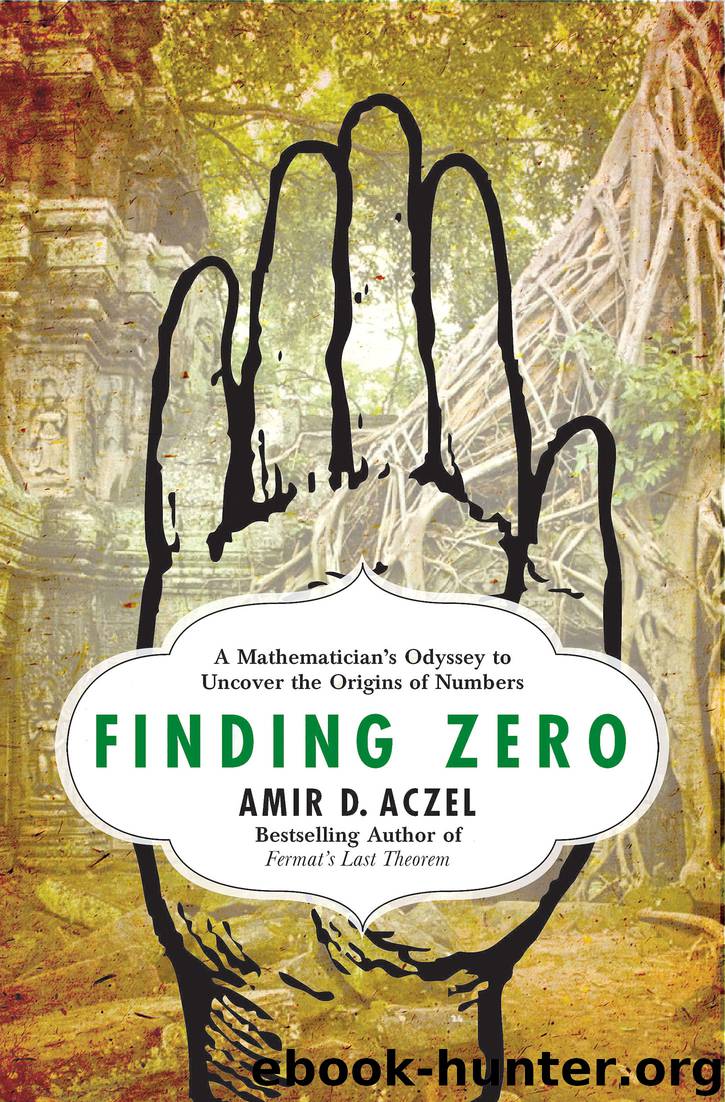Finding Zero by Amir D. Aczel

Author:Amir D. Aczel
Language: eng
Format: epub
Publisher: St. Martin's Press
Published: 2014-11-05T16:00:00+00:00
Andy Brouwer on one of his jungle adventures in Cambodia.
“How would you go about looking for K-127?” I asked Andy when he finished his story.
“I have some connections,” he said. “Let me make some phone calls, and I’ll e-mail you. I’m pretty sure someone I know can help you.”
“There is one more thing,” I said. “I am interested in meeting knowledgeable Buddhist monks who might know about the concept of the void and be able to explain it to me. You see, I think that the zero probably came from the Buddhist Shunyata.”
“That’s an interesting idea,” said Andy. “And I do know where the best place for you to look for an answer would be. It’s called Luang Prabang, in Laos. It’s a city of Wats and Buddhist monks. This is where I would go.”
I thanked him and called my driver, who took me back to the hotel through the evening traffic jams of few cars, many tuk-tuks, and thousands of motorcycles. When I turned on my computer at the hotel, there was already a message from Andy connecting me with one of his friends, a Cambodian man named Rotanak Yang who knew antiquities well. A short time later, Yang e-mailed me and promised to get in touch soon with any information, or names of people who might know something about K-127. In the meantime he told me that at one time, in the 1920s and 1930s, the inscription I was looking for was indeed held at the national museum in Phnom Penh, as I had gathered from reading Cœdès, but that it had long been removed from there—where, he didn’t know.
So the next day, I went to visit the Cambodian National Museum, not far from the Royal Palace and the rivers. A plaque by the entrance explained how the museum was founded in the 1920s with the French governor of Cambodia presiding over the ceremony and the king in attendance. I found that somewhat sad and degrading. I never did understand how a European power could come here to Southeast Asia, presumably by ships that could carry only a limited number of soldiers, and conquer lands with millions of people living in them. I knew it happened because of the crazy colonial ambition of Napoleon’s nephew, who became known as the Emperor Napoleon III.
As president of France in a democratically elected administration, Louis-Napoléon Bonaparte staged a coup against his own government to become emperor. The French military, at his command, took over the vast region they called Indochine in 1865. Five years later, this same Napoleon was brought to his knees by the Prussians attacking Paris. I always think of that dumb joke about this event: “Monsieur, table for 100,000?”
But of course the French also gave us George Cœdès, who did much for the region and brought us an understanding of its history and culture. Some of the exhibits in this museum mentioned his name. And a large plaque by the museum’s exit showed the names and photographs of all its past directors.
Download
This site does not store any files on its server. We only index and link to content provided by other sites. Please contact the content providers to delete copyright contents if any and email us, we'll remove relevant links or contents immediately.
| Arithmetic | Counting & Numeration |
| Pre-Calculus |
Modelling of Convective Heat and Mass Transfer in Rotating Flows by Igor V. Shevchuk(6420)
Weapons of Math Destruction by Cathy O'Neil(6248)
Factfulness: Ten Reasons We're Wrong About the World – and Why Things Are Better Than You Think by Hans Rosling(4723)
A Mind For Numbers: How to Excel at Math and Science (Even If You Flunked Algebra) by Barbara Oakley(3287)
Descartes' Error by Antonio Damasio(3261)
Factfulness_Ten Reasons We're Wrong About the World_and Why Things Are Better Than You Think by Hans Rosling(3224)
TCP IP by Todd Lammle(3169)
Fooled by Randomness: The Hidden Role of Chance in Life and in the Markets by Nassim Nicholas Taleb(3091)
Applied Predictive Modeling by Max Kuhn & Kjell Johnson(3050)
The Tyranny of Metrics by Jerry Z. Muller(3048)
The Book of Numbers by Peter Bentley(2955)
The Great Unknown by Marcus du Sautoy(2676)
Once Upon an Algorithm by Martin Erwig(2637)
Easy Algebra Step-by-Step by Sandra Luna McCune(2616)
Lady Luck by Kristen Ashley(2568)
Practical Guide To Principal Component Methods in R (Multivariate Analysis Book 2) by Alboukadel Kassambara(2529)
Police Exams Prep 2018-2019 by Kaplan Test Prep(2527)
All Things Reconsidered by Bill Thompson III(2381)
Linear Time-Invariant Systems, Behaviors and Modules by Ulrich Oberst & Martin Scheicher & Ingrid Scheicher(2356)
